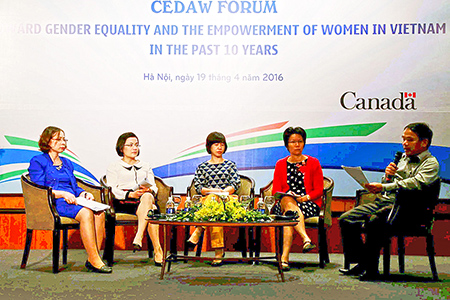Taking stock of the 10-year progress on gender equality through CEDAW in Viet Nam

Globally, the adoption of the Sustainable Development Goals has created an unprecedented momentum for the implementation of CEDAW. We have a strong stand-alone Goal 5 on gender equality, with an explicit target to end all forms of discrimination against women and girls everywhere by 2030, while gender equality is also mainstreamed throughout all Sustainable Development Goals. For the first time, there is a consensus at the highest level positioning gender equality as an enabler as well as a precondition for sustainable development.
Nevertheless,
One of the unmet target on women’s political representation is under particular attention this year as
Mr. Tran Van Thien from the Department of Labour, Invalids and Social Affairs in
The same report of the National Assembly Committee also revealed that half of the national targets were unable to be measured due to issues with data. Mr. Nguyen Trong Dam, Vice Minister of Ministry of Labour-Invalids and Social Affairs (MOLISA) emphasized the need for strengthening evidence based and independent assessment to understand the weaknesses in law and policy implementation. “We need support from the civil society and research institutions to provide a balanced understanding of the situation. only then we can seek for solutions” he added.
Implementation of CEDAW requires a concerted approach through joined-up actions by multiple stakeholders. Since 2004, UN Women has supported the implementation of CEDAW in
“We need to open up more space for civil society to be part of advising and providing feedback on whether the policies and laws are working. They are essential in giving women a voice, in channeling collective action and advocacy, and in demanding gender-responsive action.” said Shoko Ishikawa, UN Women Country Representative specifically remarking on the role of civil society in implementation of CEDAW.
“
The Viet Nam National Plan of Action to implement the Concluding Observations from the CEDAW Committee, which is being developed under MOLISA’s leadership, will be one crucial opportunity to take stock of the partnerships established and strengthened though the CEDAW SEAP Programme. At the same time, good indicators as well as capacity to collect and analyze data and information are needed so that no target will be left in the dark.
The Convention on the Elimination of All Forms of Discrimination against Women (CEDAW) was adopted by the United Nations General Assembly in December 1979. It entered into force as an international treaty on 3 September 1981 after the twentieth country had ratified it. Among the international human rights treaties, the Convention takes an important place in bringing the female half of humanity into the focus of human rights concerns. The Convention establishes not only an international bill of rights for women, but also an agenda for action by countries to guarantee the enjoyment of those rights.
 |
| Mr. Tran Van Thien (right) at a national forum on the implementation of CEDAW in |






